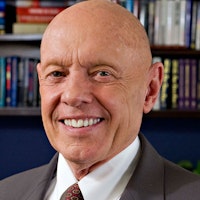Wisdom is the child of integrity—integrity is the child of humility and courage. Humility is the mother of all the virtues because humility acknowledges that there are natural laws or principles that govern the universe.
Wisdom is the child of integrity—integrity is the child of humility and courage. Humility is the mother of all the virtues because humility acknowledges that there are natural laws or principles that govern the universe.
Stephen R. Covey

Integrated Around Principles
Topic: Virtue, Morality, & Ethics
Wisdom is the child of integrity—being integrated around principles. And integrity is the child of humility and courage. In fact you could say that humility is the mother of all the virtues because humility acknowledges that there are natural laws or principles that govern the universe. They are in charge. We are not. Pride teaches us that we are in charge. Humility teaches us to understand and live by principles, because they ultimately govern the consequences of our actions. If humility is the mother, courage is the father of wisdom. Because to truly live by these principles when they are contrary to social mores, norms, and values takes enormous courage…
Stephen R. Covey was born in Salt Lake City, Utah, on October 24, 1932, and he passed away on July 16, 2012. He was more than an educator and author; he was also a family man deeply rooted in his faith. Covey was a member of The Church of Jesus Christ of Latter-day Saints. His belief in God and universal principles significantly influenced his teachings and writings. Married to Sandra Merrill Covey for over 50 years, the couple had nine children. Covey's family life and faith were central to his understanding of leadership and personal effectiveness, themes he explored in books like "The 7 Habits of Highly Effective Families."
Covey was a professor at the Jon M. Huntsman School of Business at Utah State University at the time of his death. But he was best known for his book "The 7 Habits of Highly Effective People." This book was part of a broader collection of works that also includes titles like "First Things First," "Principle-Centered Leadership," and "The 8th Habit." These books weren't just about being effective in business; they were about how to live a balanced, meaningful life.
Stephen R. Covey left a lasting impression through his teachings and writings, but perhaps his most enduring legacy is the way he lived his life. He emphasized the importance of character, integrity, and ethical leadership. These were not just principles he talked about; they were principles he lived by. His lessons continue to influence people all over the world, encouraging them to lead lives that are not only effective but also grounded in good values.
Stephen R. Covey [The 8th Habit—From Effectiveness to Greatness] pages 296-297.

Stephen R. Covey
Theme: Virtue Is

About This Stephen R. Covey Quotation [Commentary]
Stephen R. Covey teaches that “wisdom is the child of integrity—integrity is the child of humility and courage.” This unfolding begins with humility, which Covey calls “the mother of all the virtues,” because it recognizes that “there are natural laws or principles that govern the universe. They are in charge. We are not.” From this recognition, integrity arises—not as consistency with people or institutions, but as “being integrated around principles.” Only when humility opens the heart to something beyond itself, and courage strengthens the will to live by it, can wisdom emerge.
Covey draws a sharp contrast between humility and pride. Pride insists “we are in charge,” while humility “teaches us to understand and live by principles, because they ultimately govern the consequences of our actions.” Courage becomes essential when those principles conflict with “social mores, norms, and values.” To live by them “takes enormous courage.” Humility acknowledges; courage acts. Together they give birth to integrity, and through that, wisdom—wisdom that is not theoretical but lived, tested in the choices we make.
He emphasizes that these principles are not the property of any religion or culture. “No religion has a patent on them,” he writes. “They are not unique to any religion.” When people define their values through different terms or practices, Covey responds, “I’ll just go with yours.” What matters is to “live the values and to be true to the principles that underlie them.” To be integrated around principle, not around personalities or systems, is for him the meaning of integrity. And “integrity is the highest form of loyalty”—a loyalty that leads not only to trust, but ultimately, to wisdom.
Stephen R. Covey: Spiritual View of Life
To me spirituality is three things: First of all, you are dealing with the whole person. That includes the person’s spirit or soul. You cannot separate their body or their mind or their heart from their spirit, because they are all so inter-related, and there is a synergistic relationship between all these four dimensions of our nature. Any attempt to compartmentalize will reduce that synergistic effect and it will have negative repercussions on your body, your mind, your heart, your emotions, your thinking and so forth.
Another dimension would be that you are dealing with those principles that are universal and timeless.
Thirdly, spirituality deals with peace of conscience. Obeying or following your conscience, means that you are true to that which you have internalized as being right and this gives you tremendous tranquility and courage.
When I am in India I always use the “Namaste” greeting, saluting the God within you. I really do believe that we are all children of God, and I often acknowledge that God is the source of the principles and the emperor of all the credit and glory. I say to those who are not of this belief, “That’s fine, I respect you as well, I just want you to know that personally I believe that the source of all the principles that give your life its integrity, and its power and it’s meaning, all of them link up to the Divine.”
—Stephen R. Covey [“Spiritual-Based Leadership” Interview, The Global Dharma Center (Globaldharma.org)].
Spiritual Theme
One of my mottoes serves as a powerful spiritual theme for me: “Live life in crescendo.” In other words, the most important work you’ll ever do is still ahead of you.
Another such spiritual theme for me would be: “Educate and obey your conscience.” Educating as I speak of it here involves getting into the sacred literature of all the great traditions that have had enduring value and then consciously living true to what you have learned. The more you live true to it, the stronger your conscience becomes. A constant effort is required to stay on track with such stewardship.
—Stephen R. Covey [“Spiritual-Based Leadership” Interview, The Global Dharma Center (Globaldharma.org)].
Distinction Between Spirituality and Religion
I make a real conscientious effort in my leadership, writing, and speaking not to refer to any one particular religion, but only to deal with that which is universal. Although I am an active member of the Mormon Church I don’t get any Mormon theology snuck into it in some secret way. I have no hidden agenda. I am often asked the question, “How much has your Mormonism influenced your view”, and I say, “It has influenced me tremendously, but all that we are dealing with here are principles that are universal and timeless.” And then I would say, “If you disagree with me, just tell me which principles you believe in—and do you live them?”
—Stephen R. Covey [“Spiritual-Based Leadership” Interview, The Global Dharma Center (Globaldharma.org)].
To be a spiritual-based leader
Certainly principles have a moral and spiritual foundation, but no religion has a patent on them. They are not unique to any religion. They are universal and timeless. I have seen in organizations throughout the world that when there is a spirit of openness and synergy, all the values an individual organization works with are essentially identical to those of other organizations. Yes, there are different practices, and the labels—the words used to define and describe the particular values may be different—but what is being said is essentially the same. It all deals with meaning and integrity.
So if people have certain cultural definitions of what these universal principles are, and of what their values are, I say to them, “I’ll just go with yours.” The key is to live the values and to be true to the principles that underlie them, to have total integrity—to be integrated around principles—not around people or organizations. Integrity is the highest form of loyalty—and over time it produces loyalty. It’s far better to be trusted than to be liked.
To be a spiritual-based leader is to have these universal principles integrated in your inner life and to be true to them in your actions, even when it’s dark—when you have power over people and can do things and not be found out. When you have that integrity, then you have peace of conscience.
—Stephen R. Covey [“Spiritual-Based Leadership” Interview, The Global Dharma Center (Globaldharma.org)].
Additional Quotes About Practicing Universal Principles
I just finished going through four countries in Africa, three countries in the Middle East, India, and Sri Lanka, with the effort to bring together principles that are universal and timeless. I taught from Hinduism, I taught from Islam, I taught from Christianity. I just did a satellite interview to China explaining what this material can do for a Confucian nation. I teach the exact same principles no matter where I am and show that there is a universal character to these principles. They are metaphysical, they transcend the outside physical world, and they guide all behavior, all thinking, and many of them are built into assumptions that people make about nature and life.
If controversies arise or if people start feeling that I am being too religious, I say, “Let’s just stick with those principles that we all agree on. Let’s see if we can follow the principles of fairness, kindness, respect, the development and use of peoples’ talents, having meaningful work, and living with integrity. Let’s see if we can agree upon these, let’s go to our hearts and our souls and live with integrity.” That’s what I am teaching.
—Stephen R. Covey [“Spiritual-Based Leadership” Interview, The Global Dharma Center (Globaldharma.org)].
Resources
Related Quotes
Copyright © 2017 – 2026 LuminaryQuotes.com About Us